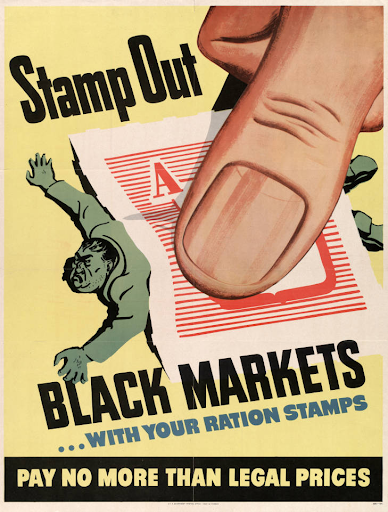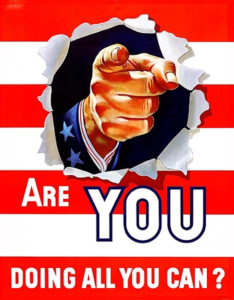What Have We Become?
After COVID-19 and murder hornets, earthquakes will probably be the next disaster to hit this country. However, it won’t be the tectonic plates smashing into each other. It will be the Greatest Generation collectively spinning in their graves.
We have become a generation of whiney, sniveling, babies. There are jellyfish with a more robust spine. Thank the sweet baby Jesus that this was not the generation asked to face down Hitler and Hirohito, because if it had, we’d all be speaking German or Japanese and The Man in the High Castle would be a documentary.
Two months! Americans have been asked to sacrifice by staying home for two months. That’s how long it took to break us. Across the country people are demonstrating in the street because they can’t take it anymore. In Colorado, a coffee shop opened up for Mother’s Day and was packed with customers, almost none of whom were wearing face masks, as an amateur bouncer open-carried at the door. These people could make all the coffee they wanted at home, or they could have ordered coffee to-go. If they wanted to support a local business, they could have taken up a collection or had groups organize orders and had one person pick them up. Instead, they decided that they would rather risk the health and safety of their community and call it freedom.
That kind of behavior is not what made America great, no matter how many red hats the patrons wore. America’s strength comes from its character. During World War II, Americans were rationed to one pound of coffee every 5 weeks or about 10 pounds a year. Later, that was reduced to one pound every 6 weeks. Americans sucked it up and did this for months, because back then we were made of stronger stuff and understood that giving up a cup of coffee actually signaled the strength of America and not its demise. That was our character. That’s what made us great.
The rationing wasn’t even because there wasn’t coffee; there had been a bumper crop in 1942. Nonetheless, Americans understood that every bean shipped to the states meant that a shipping vessel wasn’t bringing supplies to “the boys.” They also understood that their leisurely cup of joe in the morning was one less available for GI Joe fighting over there. They knew it was a sacrifice, but they were willing to make it for the greater good. So yeah, tell us again how it’s just not the same being forced to do take-out instead of sitting in a restaurant and how storming a coffee shop is making America great again.
The Greatest Generation isn’t known as such because they beat the Nazis and dropped the nuke. They are the greatest because of their collective effort to put the country first. On January 30, 1942, President Roosevelt created the Emergency Price Control Act which granted the Office of Price Administration (OPA) the authority to control prices and begin rationing products. The goal was to discourage hoarding (*cough* toilet paper) and to ensure that scarce resources were saved for those fighting on the front lines. It wasn’t popular with members of Congress or with some Americans, but it was necessary.
The first item rationed was sugar followed soon thereafter by coffee, meat, cheese, fats, canned fish, canned milk, and other processed foods. Rubber was needed so gasoline was rationed dramatically to make it more difficult for Americans to put wear on their tires. Most families could get only 3 to 8 gallons a week. Then those rations were cut even further. Posters encouraging carpooling read, “When you ride alone, you ride with Hitler!” This was back when Americans could talk tough to each other and weren’t above calling out their countrymen for being selfish.

It only took a few weeks from the rationing program’s inception before over 90 percent of the country had registered to receive their ration coupons. Americans were willing to make the sacrifice to provide for others. Foods were given point values and consumers had to match the right coupon to the correct item. When supplies became limited, the government would change the points necessary to purchase those items. Yet, Americans did not take to the streets; they remained vigilant and resolute. They could see their role in the bigger picture, a picture that was not a selfie.
Families supplemented their food by growing their own vegetables in Victory Gardens and canning those vegetables to have them available during the winter. Neighborhoods organized scrap metal drives, and folks would go through every room in their house looking for metal they could donate. No amount was too little, because they understood that it was a group effort and everyone had to participate.
We should be ashamed of ourselves complaining on Twitter because we can’t buy a toaster the exact moment we want one, or because there was a line of customers waiting to get in a store, or that, for the safety of our neighbors, we were asked to wear a mask. Is this the behavior of the greatest country in the world? Or is it the behavior of a group of entitled twits who can’t seem to hold an argument in our head that is any more complicated than a bumper sticker? It seems that if it can’t be distilled into a three-word chant, we get bored. Even three words seems to be too much sometimes, because E Pluribus Unum just doesn’t seem to hold as much sway as, “Gimme It Now!”
It wasn’t all that long ago that women were turning in their nylons to make parachutes and pulling the rubber out of their girdles to donate for submarine gaskets. Now people are storming state capitals with guns demanding that they have a right to a haircut because their bangs are getting in their eyes and their roots are showing. How did we get here?

Costco asking customers to wear masks is not tyranny. One way aisles in the grocery store do not signal the end times for America. Being required to stand in line six feet from the next person does not constitute a vast political conspiracy.
In fact, all of those things harken back to some of the greatest days in American history. These were the days when we knew what we did at home affected the safety and security of the whole world. Even children could understand that sacrifices were necessary if America was going to be victorious over its enemies.
I can’t count how many times I’ve heard my father tell me that no matter how desperately he asked for a bike as a kid, he knew he couldn’t have one because of the war. Another relative told us stories about how her neighbors all donated their sugar rations so that she could have a wedding cake. Still another, who was a salesman during the 1940s, told us about how he had to plan his trips very carefully because the gas rationing only allowed him to get a few gallons of gas a week.
Folks want to yell about Making America Great Again. Let’s start by living up to the standard set by the generations that came before us. If people are going to yell about America First, they should put that belief into action. Put the good of the country first. Put it above your own inconvenience. Do your part.
The atrophying of the economy is real. The suffering is real. The fear is real. While every student learns FDR’s famous phrase, “The only thing we have to fear is fear itself,” it would do us all some good to read the rest of his first inaugural speech. The President did not shrink from the realities of the situation that the country was facing:
“[A] host of unemployed citizens face the grim problem of existence, and an equally great number toil with little return. Only a foolish optimist can deny the dark realities of the moment… These dark days will be worth all they cost us if they teach us that our true destiny is not to be ministered unto but to minister to ourselves and to our fellow men….
Our greatest primary task is to put people to work. This is no unsolvable problem if we face it wisely and courageously… The basic thought that guides these specific means of national recovery is not narrowly nationalistic. It is the insistence, as a first consideration, upon the interdependence of the various elements in all parts of the United States — a recognition of the old and permanently important manifestation of the American spirit of the pioneer. It is the way to recovery. It is the immediate way. It is the strongest assurance that the recovery will endure.”
Likewise, we can not shrink from the realities of the situation that our country is facing. Our economy is on the precipice. Businesses cannot long endure under our current situation. Unemployment is skyrocketing. The supply chain of our food production is breaking down. However, relief from each of these will require that Americans work together towards the common goal of recovery.
Even more than we need steady leadership, we need a steady internal resolution. Communities must come together, because splintering into groups will only serve to weaken us all. Now is the time to extend a hand rather than raising a fist. We need policies that will help us bridge the gap between today and the better days that we must believe are in our future.
This crisis is pernicious and, like a hop-scotching tornado, will decimate one community while leaving another untouched. Those who can help must. Support your local businesses however you can. Donate to help limit food insecurity. Check on your friends and neighbors. Ask how you can help. Demand, from the safety of your home, that our leaders construct sound policy. Take the necessary steps to stop the spread of this disease so that we can turn the corner and begin rebuilding.
The Greatest Generation wasn’t perfect. They interned thousands of Japanese Americans without cause and allowed Jim Crow laws to terrorize African Americans. They griped about gas rationing and coffee rationing. There were black markets, but they were frowned upon, not celebrated. It was scandalous when a newspaper discovered that 200 Congressmen had been given “X” gas ration stickers which gave them access to unlimited supply of fuel. The stickers were reserved for ministers, police, firemen, and civil defense workers. There was a lot they could have done better, but there’s even more that we could be doing better.
Throughout America, eight thousand rationing boards oversaw the restrictions put in place by the federal government. The first rationing started in January of 1942 and the last didn’t end until 1947. Five years. Americans were once able to work together for the common good for a duration of years, but now we can’t last a few months before turning on each other.

People in the Greatest Generation were required to change the way they lived for the good of the country. Every aspect of their lives was affected. On the west coast they lived in darkness at night, in case a Japanese bomber made its way across the Pacific. Alcohol distilleries stopped making consumable alcohol and switched their production to industrial alcohol, so in 1944 there was no whiskey to be found on the shelves. There were no new cars, commercial trucks, or even auto parts produced between February 1942 and October 1945. Clothing options changed, as did meal planning. Not to mention the 16 million Americans who went off to fight the war.
Imagine what the world would look like if Americans back then behaved like Americans are behaving today. Imagine that they said that it was too hard, too inconvenient, and that we should just absorb the possible losses in order to live the way we want. If they had lived the way they wanted back then, we wouldn’t be living the way we want today.
 “There is one front and one battle where everyone in the United States—every man, woman, and child—is in action, and will be privileged to remain in action throughout this war. That front is right here at home, in our daily lives, and in our daily tasks.”
“There is one front and one battle where everyone in the United States—every man, woman, and child—is in action, and will be privileged to remain in action throughout this war. That front is right here at home, in our daily lives, and in our daily tasks.”
– President Franklin D. Roosevelt, April 28, 1942


